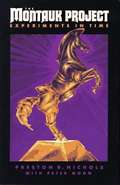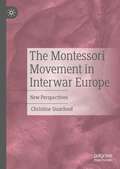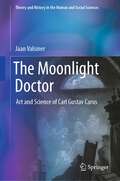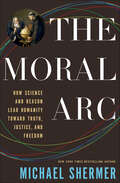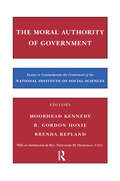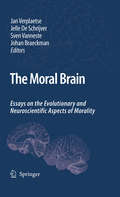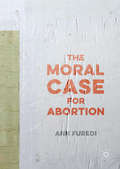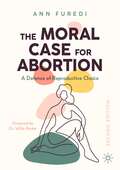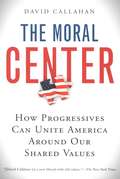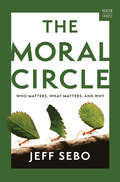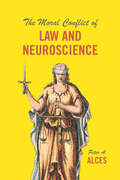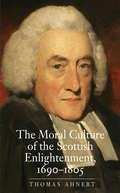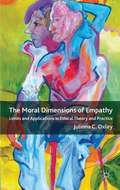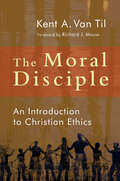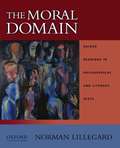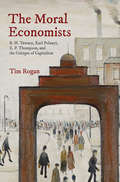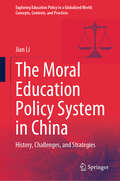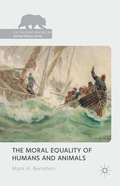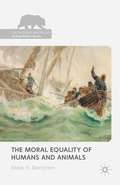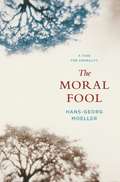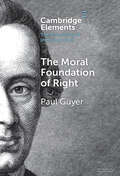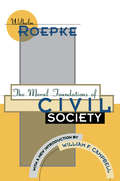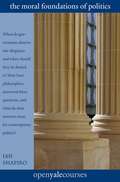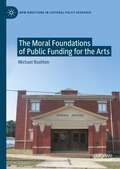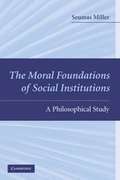- Table View
- List View
The Montauk Project: Experiments In Time
by Preston B. NicholsDiscover the truth about time. This book chronicles the most amazing and secretive research project in recorded history. We all know something is out there, we're just not sure exactly what. This book begins to provide some solid clues.
The Montessori Movement in Interwar Europe: New Perspectives
by Christine QuarfoodThis book explores how the Montessori movement developed a cultural critique and gained momentum during the interwar years of political turbulence. Drawing on archival sources, press material and Montessori's literary output, the book provides a multifaceted analysis of this significant educational movement. The first two chapters presents the scientific background, how Montessori's innovative method offered new solutions to age-old problems of teacher-pupil interaction. The following chapters focus on the social and psycho-pedagogical aspects of Montessorism, and how the movement's culture-critical message about the child's liberation was received and reinterpreted in the wider European public debate. The last four chapters shed new light on the politicisation of Italian Montessorism during the problematic Montessori-Mussolini alliance, 1924-1934.
The Moonlight Doctor: Art and Science of Carl Gustav Carus (Theory and History in the Human and Social Sciences)
by Jaan ValsinerThis is the very first authoritative book on the role of Carl Gustav Carus (1789-1869) in the history of psychology. Carus was the initiator of the notions of development, unconscious, and archetype in psychology. The book emphasizes the interdisciplinary focus of Carus’ work as it was based on the literature and art of his time and is closely related with medicine and Naturphilosophie. The readership of the book will get access to the life course of a key figure of science of the 19th century.
The Moral Arc: How Science and Reason Lead Humanity Toward Truth, Justice, and Freedom
by Michael ShermerThe New York Times–bestselling author of The Believing Brains explores how science makes us better people.From Galileo and Newton to Thomas Hobbes and Martin Luther King, Jr., thinkers throughout history have consciously employed scientific techniques to better understand the non-physical world. The Age of Reason and the Enlightenment led theorists to apply scientific reasoning to the non-scientific disciplines of politics, economics, and moral philosophy. Instead of relying on the woodcuts of dissected bodies in old medical texts, physicians opened bodies themselves to see what was there; instead of divining truth through the authority of an ancient holy book or philosophical treatise, people began to explore the book of nature for themselves through travel and exploration; instead of the supernatural belief in the divine right of kings, people employed a natural belief in the right of democracy.In The Moral Arc, Shermer explains how abstract reasoning, rationality, empiricism, skepticism—scientific ways of thinking—have profoundly changed the way we perceive morality and, indeed, move us ever closer to a more just world.“Michael Shermer is a beacon of reason in an ocean of irrationality.” —Neil deGrasse Tyson“A memorable book, a book to recommend and discuss late into the night.” —Richard Dawkins“[A] brilliant contribution . . . Sherman’s is an exciting vision.” —Nature
The Moral Authority of Government
by Henry Barbera R. HoxieThese new essays prepared to commemorate the centennial of the National Institute of Social Sciences have been carefully crafted to deal with an overriding concern of our time--those elements in political rule that go beyond legal rights and responsibilities into the moral requirements of effective governance. The principal theme of this book is presidential leadership. The presidency personifies government authority, including moral authority.In the first part of this book most of the essays argue that the moral authority of leaders depends on high personal standards as well as policy outcomes. The second segment on the rule of law and character raises considerations not limited to the presidency. Character and the authority that derives from it are demonstrated most effectively not by what someone does in his or her personal life, but in the moral values of the causes espoused and effectiveness in pursuing them. In the realm of international affairs, governmental leadership must wrestle with the moral and constitutional guidelines known as "reasons of state." Under what circumstances is it morally acceptable for a leader or government to practice deception upon the citizenry, to overthrow other governments, to bomb civilians?Many contributors raise the issue of what permits a government to take actions that would be immoral or illegal in individuals or groups. The final segment expands and deepens this theme by exploring the work and role of non-governmental agencies that influence both leaders and citizens in the public arena. In short, at a period that brings to a close a period in which the presidency has become more visible as well as more prominent, this collective effort sheds new light on classic themes. It will be an invaluable guide as we enter the new century.The contributors include an illustrious galaxy of public officials and political scientists, including Madeleine K. Albright, Judith A. Best, Betty Glad, C. Lowell Harriss, Travis Beal Jacobs, Ruth P. Morgan, Stanley A. Renshon, Donald L. Robinson and William vanden Heuvel.
The Moral Brain
by Johan Braeckman Jelle De Schrijver Jan Verplaetse Sven VannesteScientists no longer accept the existence of a distinct moral organ as phrenologists once did. A generation of young neurologists is using advanced technological medical equipment to unravel specific brain processes enabling moral cognition. In addition, evolutionary psychologists have formulated hypotheses about the origins and nature of our moral architecture. Little by little, the concept of a 'moral brain' is reinstated. As the crossover between disciplines focusing on moral cognition was rather limited up to now, this book aims at filling the gap. Which evolutionary biological hypotheses provide a useful framework for starting new neurological research? How can brain imaging be used to corroborate hypotheses concerning the evolutionary background of our species? In this reader, a broad range of prominent scientists and philosophers shed their expert view on the current accomplishments and future challenges in the field of moral cognition and assess how cooperation between neurology and evolutionary psychology can boost research into the field of the moral brain.
The Moral Case for Abortion
by Ann FurediThis thought-provoking book sets out the ethical arguments for a woman’s right to choose. Drawing on the traditions of sociological thinking and moral philosophy, it maintains that there is a strong moral case for recognizing autonomy in personal decision-making about reproductive intentions. More than this, it argues that to prevent a woman from making her own choice to continue or end her pregnancy is to undermine the essence of her humanity. The author, a provider of abortion services in the UK, asserts that true respect for human life and true regard for individual conscience demand that we respect a woman’s right to decide, and that support for a woman’s right to a termination has moral foundations and ethical integrity. This fresh perspective on abortion will interest both pro- and anti-choice individuals and organizations, along with academics in the fields of gender studies, philosophy, ethics and religion.
The Moral Case for Abortion: A Defence of Reproductive Choice
by Ann FurediThis revised and updated edition of the 2016 bestselling work sets out the moral arguments for a woman’s right to decide the future of her pregnancy. Drawing on traditions of philosophical and sociological thinking, it presents the case for recognizing autonomy in personal, private decision-making about reproductive intentions. Further, it argues that to prevent a woman making this decision according to her own values is to undermine the essence of her humanity. The author explores how true respect for human life and regard for individual conscience demands that we support a woman’s right to decide, and that support for her right to terminate her pregnancy has moral foundations and ethical integrity. This second edition features a foreword by US abortion provider and reproductive justice advocate Dr. Willie Parker, as well as additional chapters that consider the rights of doctors and nurses to withdraw from abortion provision on grounds of conscience. Furedi also surveys the rapidly changing landscape of the abortion debate, including the rights of women in the aftermath of Trump's presidency; debates, politics and religion in Northern Ireland and the Republic of Ireland; and the differing levels of provision across Europe.
The Moral Center: How Progressives Can Unite America Around Our Shared Values
by David CallahanA &“new liberal with old values&” argues nothing is the matter with Kansas—and that the Democratic party needs to lead America out of its moral crisis (The New York Times). In this insightful book, the author of The Cheating Culture addresses the anxieties that many Americans share, pointing out that the problems most people care about are not hot-button partisan issues like abortion and gay marriage, but rather deeper subjects that neither party is addressing—the selfishness that is careening out of control, the effect of our violent and consumerist culture on children, and our lack of a greater purpose. As Republicans veer into zealotry, liberals can find common ground with the moderate majority. But to achieve electoral victories, they need a powerful new vision. In The Moral Center, David Callahan articulates that vision—and offers an escape from the dead-end culture war. With insights garnered from in-depth research and interviews, he examines some of our most polarized conflicts and presents unexpected solutions that lay out a new road map to the American center. &“Brilliant, challenging, practical and hopeful.&” —E. J. Dionne Jr., author of Why Americans Hate Politics &“Callahan shows why progressives often seem not to have such a [moral] center, ceding values to the Right, and why they need to get one to win the political battle.&” —Benjamin R. Barber, author of Consumed and Jihad vs. McWorld &“Callahan wants . . . to create a new public morality that is concerned about both poverty and video game violence, both wages and rap lyrics. He wants to soften the jagged edges of the culture wars.&” —Michael Tomasky, The New York Review of Books
The Moral Circle: Who Matters, What Matters, and Why (A Norton Short)
by Jeff SeboA philosopher calls for a revolution in ethics, suggesting we expand our “moral circle” to include insects, AI systems, and even microbes. Today, human exceptionalism is the norm. Despite occasional nods to animal welfare, we prioritize humanity, often neglecting the welfare of a vast number of beings. As a result, we use hundreds of billions of vertebrates and trillions of invertebrates every year for a variety of purposes, often unnecessarily. We also plan to use animals, AI systems, and other nonhumans at even higher levels in the future. Yet as the dominant species, humanity has a responsibility to ask: Which nonhumans matter, how much do they matter, and what do we owe them in a world reshaped by human activity and technology? In The Moral Circle, philosopher Jeff Sebo challenges us to include all potentially significant beings in our moral community, with transformative implications for our lives and societies This book explores provocative case studies such as lawsuits over captive elephants and debates over factory-farmed insects, and compels us to consider future ethical quandaries, such as whether to send microbes to new planets, and whether to create virtual worlds filled with digital minds. Taking an expansive view of human responsibility, Sebo argues that building a positive future requires the shedding of human exceptionalism and radically rethinking our place in the world.
The Moral Conflict of Law and Neuroscience
by Peter A. AlcesLaw relies on a conception of human agency, the idea that humans are capable of making their own choices and are morally responsible for the consequences. But what if that is not the case? Over the past half century, the story of the law has been one of increased acuity concerning the human condition, especially the workings of the brain. The law already considers select cognitive realities in evaluating questions of agency and responsibility, such as age, sanity, and emotional distress. As new neuroscientific research comprehensively calls into question the very idea of free will, how should the law respond to this revised understanding? Peter A. Alces considers where and how the law currently fails to appreciate the neuroscientific revelation that humans may in key ways lack normative free will—and therefore moral responsibility. The most accessible setting in which to consider the potential impact of neuroscience is criminal law, as certain aspects of criminal law already reveal the naiveté of most normative reasoning, such as the inconsistent treatment of people with equally disadvantageous cognitive deficits, whether congenital or acquired. But tort and contract law also assume a flawed conception of human agency and responsibility. Alces reveals the internal contradictions of extant legal doctrine and concludes by considering what would be involved in constructing novel legal regimes based on emerging neuroscientific insights.
The Moral Culture of the Scottish Enlightenment
by Thomas AhnertIn the Enlightenment it was often argued that moral conduct, rather than adherence to theological doctrine, was the true measure of religious belief. Thomas Ahnert argues that this "enlightened" emphasis on conduct in religion relied less on arguments from reason alone than has been believed. In fact, Scottish Enlightenment champions advocated a practical program of "moral culture," in which revealed religion was of central importance. Ahnert traces this to theological controversies going back as far as the Reformation concerning the conditions of salvation. His findings present a new point of departure for all scholars interested in the intersection of religion and Enlightenment.
The Moral Dimensions of Empathy
by Julinna C. OxleyDoes empathy help us to be moral? The author argues that empathy is often instrumental to meeting the demands of morality as defined by various ethical theories. This multi-faceted work links psychological research on empathy with ethical theory and contemporary trends in moral education.
The Moral Disciple: An Introduction to Christian Ethics
by Kent A. Van TilThe ability to judge good from bad, right from wrong, is a uniquely human characteristic. However, given the complexity of life, it is often difficult to discern which choice to make, where our responsibilities lie, or what the consequences of an action (or of a nonaction) will be. In The Moral Disciple Kent Van Til surveys the skills and dispositions that we need to address moral issues responsibly. This basic introduction to Christian ethics — the systematic evaluation of morality — highlights the centrality of Christ and the Christian faith in moral formation, and it offers an ethical framework to guide Christians as they engage a host of moral dilemmas, including those surrounding wealth, sexuality, and the end of life. Using easy-to-read prose and defining terms carefully, Van Til provides an accessible introduction to this crucial and practical subject.
The Moral Domain: Guided Readings in Philosophical and Literary Texts
by Norman Lillegard<p>This engaging, interactive and pedagogical introduction to ethics combines the best features of a textbook and an anthology. The Moral Domain: Guided Readings in Philosophical and Literary Texts contains numerous readings from key philosophical writings in ethics along with captivating literary selections that bring the ethical issues to life. Offering extensive excerpts from major figures in the history of Western ethics--Aquinas, Aristotle, Hobbes, Hume, Kant, Mill and Plato--the book also integrates work from non-Western perspectives, including selections from the Bhagavad Gita, Confucian views and Hsun-Tzu. It also represents women's voices with readings by Julia Annas, Sarah Broadie, Carol Gilligan, Martha Nussbaum and others. Literary selections--including work from the Bible, Camus, Dostoevsky, Golding, Sophocles, Tolstoy, Twain and Wharton--enable students to grasp deep ethical concepts at an intuitive level. <p>The Moral Domain features a unique built-in study guide that helps students to better comprehend and interact with the material. It introduces each selection with orienting questions and then intersperses explanations, commentary and study questions (designed to test comprehension and provoke reflection) throughout the readings. Each chapter includes a "Further Discussion and Applications" section that demonstrates how ethical theory affects such contemporary moral debates and problems as abortion, euthanasia, feminism, hunger, warfare and more. An exemplary text for introduction to ethics and moral philosophy courses, The Moral Domain provides a comprehensive and accessible introduction to all facets of ethics; its foundations, history, debates and current real-life controversies.</p>
The Moral Economists: R. H. Tawney, Karl Polanyi, E. P. Thompson, and the Critique of Capitalism
by Tim RoganA fresh look at how three important twentieth-century British thinkers viewed capitalism through a moral rather than material lensWhat’s wrong with capitalism? Answers to that question today focus on material inequality. Led by economists and conducted in utilitarian terms, the critique of capitalism in the twenty-first century is primarily concerned with disparities in income and wealth. It was not always so. The Moral Economists reconstructs another critical tradition, developed across the twentieth century in Britain, in which material deprivation was less important than moral or spiritual desolation.Tim Rogan focuses on three of the twentieth century’s most influential critics of capitalism—R. H. Tawney, Karl Polanyi, and E. P. Thompson. Making arguments about the relationships between economics and ethics in modernity, their works commanded wide readerships, shaped research agendas, and influenced public opinion. Rejecting the social philosophy of laissez-faire but fearing authoritarianism, these writers sought out forms of social solidarity closer than individualism admitted but freer than collectivism allowed. They discovered such solidarities while teaching economics, history, and literature to workers in the north of England and elsewhere. They wrote histories of capitalism to make these solidarities articulate. They used makeshift languages of “tradition” and “custom” to describe them until Thompson patented the idea of the “moral economy.” Their program began as a way of theorizing everything economics left out, but in challenging utilitarian orthodoxy in economics from the outside, they anticipated the work of later innovators inside economics.Examining the moral cornerstones of a twentieth-century critique of capitalism, The Moral Economists explains why this critique fell into disuse, and how it might be reformulated for the twenty-first century.
The Moral Education Policy System in China: History, Challenges, and Strategies (Exploring Education Policy in a Globalized World: Concepts, Contexts, and Practices)
by Jian LiThis book examines the moral education policy system in China, discussing the challenges of promoting moral education policy in the country, and proposes relative strategies. It explores the moral education policy in China from various perspectives, including in preschool education, primary education, higher education, vocational type-based higher education, secondary vocational education, English education, music education, classroom teaching, citizenship education, and Chinese language education. This book serves as a guide for scholars and researchers who are interested, and work in, research on moral education policy in China, administrators, stakeholders in China's education system, and graduate students who major or minor in the field of moral education policy in China.
The Moral Equality of Humans and Animals (The Palgrave Macmillan Animal Ethics Series)
by Mark BernsteinThe Moral Equality of Humans and Animals.
The Moral Equality of Humans and Animals (The Palgrave Macmillan Animal Ethics Series)
by Mark H BernsteinReceived opinion has it that humans are morally superior to non-human animals; human interests matter more than the like interests of animals and the value of human lives is alleged to be greater than the value of nonhuman animal lives. Since this belief causes mayhem and murder, its de-mythologizing requires urgent attention.
The Moral Fool: A Case for Amorality
by Hans-Georg MoellerJustice, equality, and righteousness-these are some of our greatest moral convictions. Yet in times of social conflict, morals can become rigid, making religious war, ethnic cleansing, and political purges possible. Morality, therefore, can be viewed as pathology-a rhetorical, psychological, and social tool that is used and abused as a weapon. An expert on Eastern philosophies and social systems theory, Hans-Georg Moeller questions the perceived goodness of morality and those who claim morality is inherently positive. Critiquing the ethical "fanaticism" of Western moralists, such as Immanuel Kant, Lawrence Kohlberg, John Rawls, and the utilitarians, Moeller points to the absurd fundamentalisms and impracticable prescriptions arising from definitions of good. Instead he advances a theory of "moral foolishness," or moral asceticism, extracted from the "amoral" philosophers of East Asia and such thinkers as Ludwig Wittgenstein and Niklas Luhmann. The moral fool doesn't understand why ethics are necessarily good, and he isn't convinced that the moral perspective is always positive. In this way he is like most people, and Moeller defends this foolishness against ethical pathologies that support the death penalty, just wars, and even Jerry Springer's crude moral theater. Comparing and contrasting the religious philosophies of Christianity, Daoism, and Zen Buddhism, Moeller presents a persuasive argument in favor of amorality.
The Moral Foundation of Right (Elements in the Philosophy of Immanuel Kant)
by Paul GuyerKant defined 'Right' (Recht) as the condition that obtains among a population of physically embodied persons capable of setting their own ends who live on a finite surface and therefore cannot avoid interaction with each other if each is as free to set their own ends as is consistent with the freedom of all to do the same. He regarded this rational idea, heir to the traditional idea of 'natural Right, as the test of the legitimacy of the laws of any actual state, or 'positive Right.' He clearly considered Right to be part of morality as a whole, namely the coercively enforceable part, as contrasted to Ethics, which is the non-coercively enforceable part of morality. Some have questioned whether Right is part of morality, but this Element shows how Kant's "Universal Principle of Right" follows straightforwardly from the foundational idea of Kant's moral philosophy as a whole.
The Moral Foundations of Civil Society
by Wilhelm RoepkeWilhelm Roepke may have been the soundest economist of the twentieth century. He understood the limitations as well as the strengths of his discipline. Economists are often tempted to take the easy way out, by denying reality to aspects of human existence and reducing them to arbitrary and subjective tastes and preferences. Roepke never does this, and this is his strength. He realizes that all of these are legitimate aspects of human experience which must be satisfied in a balanced and harmonious social existence. Nature, sex, religion, beauty, and politics are all meaningful as parts of the whole. Problems occur only when each segment attempts to become the whole.The original title of this book, Civitas Humana, contains a double meaning. It promises a treatment of questions fundamental not only to human society but also to humane society. The volume combines distinct aspects of life. Half of the book is devoted to questions of economic and social life. The other half examines spiritual and national life. Chapters include Moral Foundations, The Place of Science in the City of Man, Counterweights to the State, Congestion and Proletarianisation of Society, and Economic System and International New Order.Although Roepke recognized the validity of the nation in the modern world, he was constantly trying to find the smaller agencies within society in which real allegiances and loyalties were to be developed. His ideas continue to be of significance. As described by William F. Campbell in the new introduction, The Moral Foundations of Civil Society is a necessary addition to the libraries of economists, sociologists, theologians, and philosophers.
The Moral Foundations of Politics
by Ian ShapiroWhen do governments merit our allegiance, and when should they be denied it? Ian Shapiro explores this most enduring of political dilemmas in this innovative and engaging book. <P><P> Building on his highly popular Yale courses, Professor Shapiro evaluates the main contending accounts of the sources of political legitimacy. Starting with theorists of the Enlightenment, he examines the arguments put forward by utilitarians, Marxists, and theorists of the social contract. Next he turns to the anti-Enlightenment tradition that stretches from Edmund Burke to contemporary post-modernists. In the last part of the book Shapiro examines partisans and critics of democracy from Plato's time until our own. He concludes with an assessment of democracy's strengths and limitations as the font of political legitimacy. The book offers a lucid and accessible introduction to urgent ongoing conversations about the sources of political allegiance.
The Moral Foundations of Public Funding for the Arts (New Directions in Cultural Policy Research)
by Michael RushtonThis book provides a detailed account, and critique, of diverse approaches to the arts funding question, with a focus on the arm’s length arts councils that are the norm in the Anglo-American world. It builds on economic methods, the liberal-egalitarian framework of John Rawls, the communitarian opposition to the liberal framework, the capabilities approach to equality, and the cultural conservatism of Roger Scruton and others. In each case, the book considers the very practical aspect of public funding of the arts, namely, what are the implications for what ought to receive priority, and what parts of the cultural world are best left to their own, private sector, devices. It is not a work of “arts advocacy”. Rather, the book challenges assumptions, and sparks critical debate in the field.
The Moral Foundations of Social Institutions
by Seumas MillerIn this book, Seumas Miller examines the moral foundations of contemporary social institutions. Offering an original general theory of social institutions, he posits that all social institutions exist to realize various collective ends, indeed, to produce collective goods. He analyses key concepts such as collective responsibility and institutional corruption. Miller also provides distinctive special theories of particular institutions, including governments, welfare agencies, universities, police organizations, business corporations, and communications and information technology entities. These theories are philosophical and, thus, foundational and synoptic in character. They are normative accounts of a sampling of contemporary social institutions, not descriptive accounts of all social institutions, both past and present. Miller also addresses various ethical challenges confronting contemporary institutional designers and policymakers, including the renovation of the international financial system, the 'dumbing down' of the media, the challenge of world poverty, and human rights infringements by security agencies combating global terrorism.
